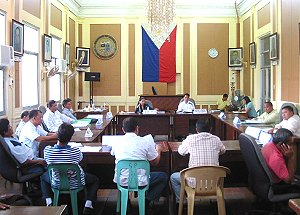Majority pushes TRO to
block budget release
By GINA DEAN-RAGUDO, Samar News.com
September
2, 2010
CALBAYOG CITY – To
make it stronger, Samar’s first district board members filed a
petition in court questioning the validity of the budget approval last
August 26, 2010 during the regular session. Such move was preceded by
a disclaimer executed on August 27 signed by Majority Floor Leader
Charlie Coñejos, SP members Noel Sermense, Renato Uy, Prudencio Dy,
Jasper Sumagang, Eunice Babalcon and Jimmy Dy addressed to Provincial
Budget Officer Maximo Sison.
Liberal Party’s Legal
Adviser Roger Casurao said that the Temporary Restraining Order (TRO)
is the most convenient and appropriate way of approaching the problem
in order to prevent the province from releasing the budget. The
passage of the 2010 budget was declared null and void because the
procedure adopted by the board members present was improper and
illegal as it failed to meet the necessary requirement for approval
which requires the majority vote of all the members of the Sangguniang
Panlalawigan.
 Based on the record,
only 5 members of the Sanggunian signed for the passage, while the
letter of disclaimer was signed by 7.
Based on the record,
only 5 members of the Sanggunian signed for the passage, while the
letter of disclaimer was signed by 7.
Moreover, the 2010
annual budget was unceremoniously, clandestinely and surreptitiously
treated during said regular session as it was not calendared and was
only brought on the item for Other Matters despite the fact that said
2010 budget is already with the proper committees, and is under
treatment and consideration.
“We learned our
lessons already in approving the budget. If you’re going to examine
the budget very closely, it is characterized by absurdities. Too much
concentration on the purchase of medicines by hundreds of millions”,
he recalled as a former SP member.
Clarifying the “walk
out scenario” of Board Member Sermense, Casurao admitted that the
former has indeed left the session hall when Liga President Joseph
Escober injected the idea of discussing the budget under Other
Matters, followed up by BM Juan Latorre who spoke for its approval
manifesting his argument that the committees in charged were no longer
taking part in the budget hearing and the August body should assume
responsibility (overlooking the 8-vote requirement and the petition).
Be it noted that it
was Latorre who spared the majority bloc from opposition’s annoyance.
He justified in the previous press conference initiated by Governor
Sharee Ann Tan that the new set of board members are rational compared
to the old one.
As a consequence,
former SP member now Calbayog City Councilor Roger Casurao explained
the non-passage of the 2009 budget for its unjust formulation as it
actually did not address the real problems of the province. The Annual
Investment Plan (AIP) submitted to the August body was highly
questionable. First, the economic policy of a local government unit
should be based on a 10 year Comprehensive Development Program and not
on a yearly basis.
“So I was wondering
where they got their AIP. There was nothing to take it from! Why
should we entertain an annual budget that is not precedent to the AIP?
And even if there was, we are certain… that
AIP was bogus”, he asserted.
Casurao added that if
there is a failure to come out with a regular budget the law on
reenactment will come in. The reason is to prevent the hiatus in the
delivery of basic services in the province. Irrespective of whoever
sits as local chief executive, the fixed mandatory budget such as the
5% calamity fund, personnel services and MOOE (Miscellaneous and Other
Operating Expenses) shall not affected. What prevents the majority
from passing the budget is the utilization of the 20% Development
Fund.
“The reason why we are
against the budget because of the poor utilization. Kag-upay pa ba san
mga ngaran san ira programa – poverty alleviation, hunger mitigation,
but it has no meaning! Ada la iton san paraffle, panhatag bugas and
the like. Magsakit ira buot kay diri nira nadudukaw an 20% Development
Fund nga mao pirme an source of corruption”
He revealed that the
province’s income is only P3M and the government is just relying on
the IRA (Internal Revenue Allotment) without formulating tax
efficiency measures and improving production.